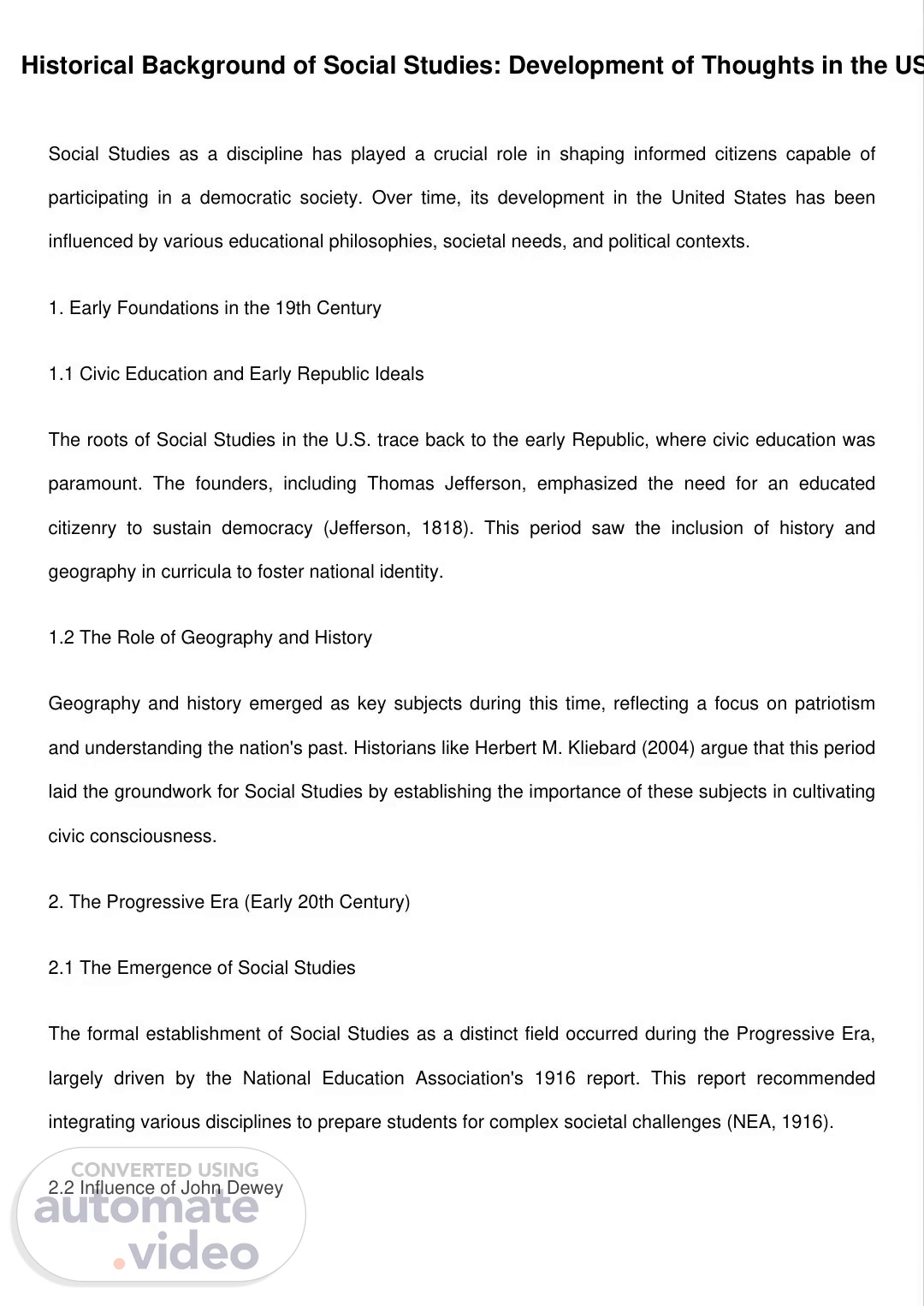Scene 1 (0s)
Historical Background of Social Studies: Development of Thoughts in the US Social Studies as a discipline has played a crucial role in shaping informed citizens capable of participating in a democratic society. Over time, its development in the United States has been influenced by various educational philosophies, societal needs, and political contexts. 1. Early Foundations in the 19th Century 1.1 Civic Education and Early Republic Ideals The roots of Social Studies in the U.S. trace back to the early Republic, where civic education was paramount. The founders, including Thomas Jefferson, emphasized the need for an educated citizenry to sustain democracy (Jefferson, 1818). This period saw the inclusion of history and geography in curricula to foster national identity. 1.2 The Role of Geography and History Geography and history emerged as key subjects during this time, reflecting a focus on patriotism and understanding the nation's past. Historians like Herbert M. Kliebard (2004) argue that this period laid the groundwork for Social Studies by establishing the importance of these subjects in cultivating civic consciousness. 2. The Progressive Era (Early 20th Century) 2.1 The Emergence of Social Studies The formal establishment of Social Studies as a distinct field occurred during the Progressive Era, largely driven by the National Education Association's 1916 report. This report recommended integrating various disciplines to prepare students for complex societal challenges (NEA, 1916). 2.2 Influence of John Dewey.
Scene 2 (53s)
John Dewey's educational philosophy, emphasizing experiential learning and democracy, significantly impacted Social Studies. Dewey (1916) argued that education should connect students to their communities and the broader world, laying the foundation for a more interdisciplinary and inquiry-based approach to Social Studies. 3. Mid-20th Century Developments 3.1 The Cold War Context During the Cold War, Social Studies curricula were heavily influenced by the need to promote national unity and counteract communist ideologies. Educational reforms of this era often emphasized American exceptionalism and the promotion of democratic values (Ravitch, 2000). 3.2 The New Social Studies Movement In response to societal changes in the 1960s and 1970s, the New Social Studies movement advocated for critical thinking and the exploration of controversial topics. This period reflected a shift toward inquiry-based learning, with a focus on social issues and diversity (Evans, 2004). 4. Late 20th Century to Present 4.1 Standards-Based Reform The 1980s and 1990s saw the rise of standards-based reform, emphasizing accountability and measurable outcomes in education. The publication of the National Standards for History (Nash, 1996) and National Curriculum Standards for Social Studies (NCSS, 1994) marked a move toward uniformity in what students should learn nationwide. 4.2 Multiculturalism and Globalization In recent years, Social Studies has increasingly focused on multiculturalism and global awareness. Scholars like Banks (2008) highlight how modern curricula incorporate themes of diversity, human.
Scene 3 (1m 47s)
rights, and environmental sustainability, reflecting the growing interconnectedness of the world. Conclusion The evolution of Social Studies in the United States demonstrates the discipline's adaptability to societal changes and its enduring importance in preparing students for informed citizenship. From its origins in civic education to its modern emphasis on global awareness, Social Studies continues to be a vital component of American education. References - Banks, J. A. (2008). An Introduction to Multicultural Education. Allyn & Bacon. - Dewey, J. (1916). Democracy and Education: An Introduction to the Philosophy of Education. Macmillan. - Evans, R. W. (2004). The Social Studies Wars: What Should We Teach the Children?. Teachers College Press. - Jefferson, T. (1818). Report of the Commissioners for the University of Virginia. Retrieved from Monticello.org. - Kliebard, H. M. (2004). The Struggle for the American Curriculum, 1893-1958. Routledge. - Nash, G. B. (1996). National Standards for History: Basic Edition. National Center for History in the Schools. - National Council for the Social Studies. (1994). Expectations of Excellence: Curriculum Standards for Social Studies. NCSS. - National Education Association. (1916). The Social Studies in Secondary Education. NEA. - Ravitch, D. (2000). Left Back: A Century of Battles Over School Reform. Simon & Schuster..
